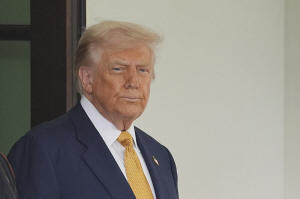Senate passes $9 billion in spending cuts to public broadcasting,
foreign aid requested by Trump
[July 17, 2025]
By KEVIN FREKING and MARY CLARE JALONICK
WASHINGTON (AP) — The Senate has passed about $9 billion in federal
spending cuts requested by President Donald Trump, including deep
reductions to public broadcasting and foreign aid, moving forward on one
of the president's top priorities despite concerns from several
Republican senators.
The legislation, which now moves to the House, would have a tiny impact
on the nation's rising debt but could have major ramifications for the
targeted spending, from the Corporation for Public Broadcasting to U.S.
food aid programs abroad.
It also could complicate efforts to pass additional spending bills this
year, as Democrats and even some Republicans have argued they are ceding
congressional spending powers to Trump with little idea of how the White
House Office of Management and Budget would apply the cuts.
The 51-48 vote came after 2 a.m. Thursday after Democrats sought to
remove many of the proposed rescissions during 12 hours of amendment
votes. None of the Democratic amendments were adopted.
Senate Majority Leader John Thune, R-S.D., said Republicans were using
the president’s rescissions request to target wasteful spending. He said
it is a “small but important step for fiscal sanity that we all should
be able to agree is long overdue.”
But Senate Appropriations Committee Chairwoman Susan Collins, R-Maine,
said the bill “has a big problem — nobody really knows what program
reductions are in it.”

Collins and Sen. Lisa Murkowski, R-Alaska, joined Democrats in voting
against the legislation. Kentucky Sen. Mitch McConnell, the former
Republican leader, had voted against moving forward with the bill in a
Tuesday procedural vote, saying he was concerned the Trump White House
wanted a “blank check," but he ultimately voted for final passage.
The effort to claw back a sliver of federal spending comes after
Republicans also muscled Trump’s big tax and spending cut bill to
approval without any Democratic support. The Congressional Budget Office
has projected that measure will increase future federal deficits by
about $3.3 trillion over the coming decade.
Lawmakers clash over cuts to public radio and TV stations
Along with Democrats, Collins and Murkowski both expressed concerns
about the cuts to public broadcasting, saying they could affect
important rural stations in their states.
Murkowski said in a speech on the Senate floor Tuesday that the stations
are "not just your news — it is your tsunami alert, it is your landslide
alert, it is your volcano alert.”
Less than a day later, as the Senate debated the bill, a 7.3 magnitude
earthquake struck off the remote Alaska Peninsula, triggering tsunami
warnings on local public broadcasting stations that advised people to
get to higher ground.
The situation is “a reminder that when we hear people rant about how
public broadcasting is nothing more than this radical, liberal effort to
pollute people's minds, I think they need to look at what some of the
basic services are to communities," Murkowski said.
The legislation would claw back nearly $1.1 billion from the Corporation
for Public Broadcasting, which represents the full amount it’s due to
receive during the next two budget years.
The corporation distributes more than 70% of the money to more than
1,500 locally operated public television and radio stations, with much
of the remainder assigned to National Public Radio and the Public
Broadcasting Service to support national programming.

Sen. Mike Rounds, R-S.D., said he secured a deal from the White House
that some funding administered by the Interior Department would be
repurposed to subsidize Native American public radio stations in about a
dozen states.
But Kate Riley, president and CEO of America’s Public Television
Stations, a network of locally owned and operated stations, said that
deal was “at best a short-term, half-measure that will still result in
cuts and reduced service at the stations it purports to save, while
leaving behind all other stations, including many that serve Native
populations.”
[to top of second column]
|

President Donald Trump waits to greet Bahrain's Crown Prince Salman
bin Hamad Al Khalifa at the White House, Wednesday, July 16, 2025,
in Washington. (AP Photo/Evan Vucci)

Slashing billions of dollars from foreign aid
The legislation would also claw back about $8 billion in foreign aid
spending.
Among the cuts are $800 million for a program that provides
emergency shelter, water and sanitation and family reunification for
those who flee their own countries and $496 million to provide food,
water and health care for countries hit by natural disasters and
conflicts. There also is a $4.15 billion cut for programs that aim
to boost economies and democratic institutions in developing
nations.
Democrats argued the Trump administration's animus toward foreign
aid programs would hurt America's standing in the world and create a
vacuum for China to fill.
Sen. Brian Schatz, D-Hawaii, said the amount of money it takes to
save a starving child or prevent the transmission of disease is
miniscule, even as the investments secure cooperation with the U.S.
on other issues. The cuts being made to foreign aid programs through
Trump's Department of Government Efficiency were having
life-and-death consequences around the world, he said.
“People are dying right now, not in spite of us but because of us,”
Schatz said. “We are causing death.”
After objections from several Republicans, GOP leaders took out a
$400 million cut to PEPFAR, a politically popular program to combat
HIV/AIDS that is credited with saving millions of lives since its
creation under then-President George W. Bush.
Looking ahead to future spending fights
Democrats say the bill upends a legislative process that typically
requires lawmakers from both parties to work together to fund the
nation’s priorities. Triggered by the official recissions request
from the White House, the legislation only needs a simple majority
vote instead of the 60 votes usually required to break a filibuster,
meaning Republicans can use their 53-47 majority to pass it along
party lines.
The Trump administration is promising more rescission packages to
come if the first effort is successful. But some Republicans who
supported the bill indicated they might be wary of doing so again.

“Let’s not make a habit of this,” said Senate Armed Services
Committee Chairman Roger Wicker, who voted for the bill but said he
was wary that the White House wasn’t providing enough information on
what exactly will be cut. Wicker said there are members “who are
very concerned, as I am, about this process.”
North Carolina Sen. Thom Tillis echoed similar concerns and said
Republicans will need to work with Democrats to keep the government
running later in the year.
“The only way to fund the government is to get at least seven
Democrats to vote with us at the end of September or we could go
into a shutdown,” Tillis said.
Republicans face a Friday deadline
Collins attempted to negotiate a last minute change to the package
that would have reduced the cuts by about $2.5 billion and restored
some of the public broadcasting and global health dollars, but she
abandoned the effort after she didn't have enough backing from her
Republican colleagues in the Senate and the House.
The House has already shown its support for the president’s request
with a mostly party line 214-212 vote, but since the Senate amended
the bill, it will have to go back to the House for another vote.
The bill must be signed into law by midnight Friday for the proposed
rescissions to kick in. If Congress doesn't act by then, the
spending stands.
___
Becky Bohrer in Juneau, Alaska, contributed to this report.
All contents © copyright 2025 Associated Press. All rights reserved |